The history of the term
Brother Jonathan appeared in newspapers across the world (syndicated
news) as a factoid such as the following example seen in 1877 and
1878. These factoids would appear for decades in US newspapers across
the country.
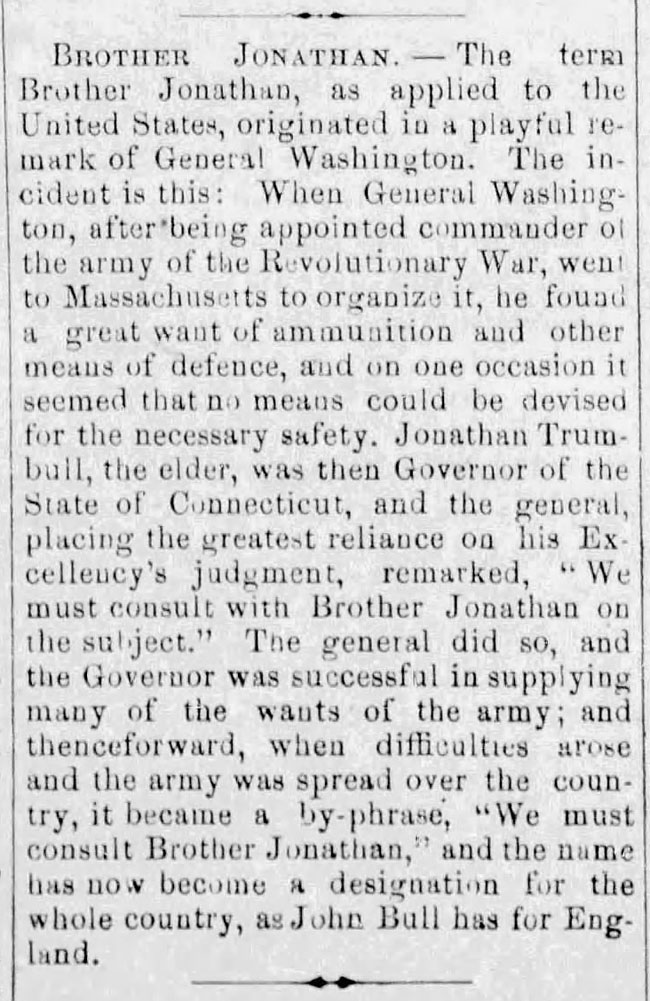
Tulare County Times,
January 5, 1878, p. 2 (Visalia, CA)
The Folsom Telegraph,
December 29, 1877 p.1 (Folsom, CA)
The Leavenworth Press,
November 3, 1877 p. 2 (Leavenworth, KS)
Catoctin Clarion, June
28, 1877, p.2 (Mechanicstown, MA)
The Daily Journal of
Commerce, October 9, 1877 p.1 (Kansas City, MO) reported this
same article (as above) but ended it by saying "Well, we must
consult Brother Jonathan" The origin of the phrase was soon lost
sight of, but "Brother Jonathan" continues to be our national
sobriquet."
Similiar 1878 articles
about the the history of the term Brother Jonathan would appear
in newspapers across the world as a factoid emphasizing Jonathan's
original role as a fixer and someone to consult in difficult times.
It was this same time period when Uncle Sam was becoming the prominent
representative of the federal government and symbol of the United
States with Brother Jonathan morphing into a revised Uncle
Sam.
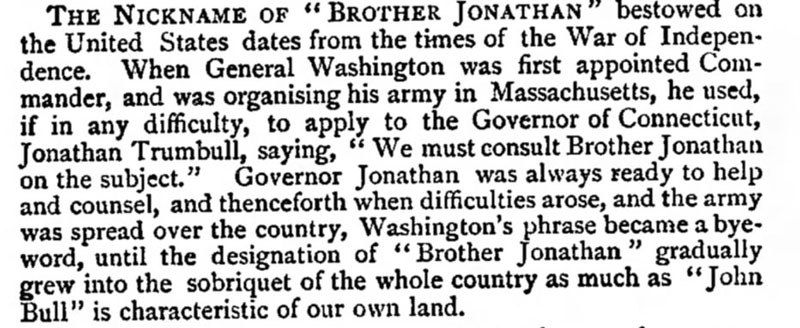
The Graphic: A Weekly
Illustrated Newspaper, June 15, 1878, p.9 (London)
The New York Daily Herald
in 1878 published a lengthy article about success of The Children's
Carnival and Ball sponsored by the Music Academy. It was noted
that the programme opened with "Prince Carnival" offering
his services to the Goddess of Liberty and Brother Jonathan."
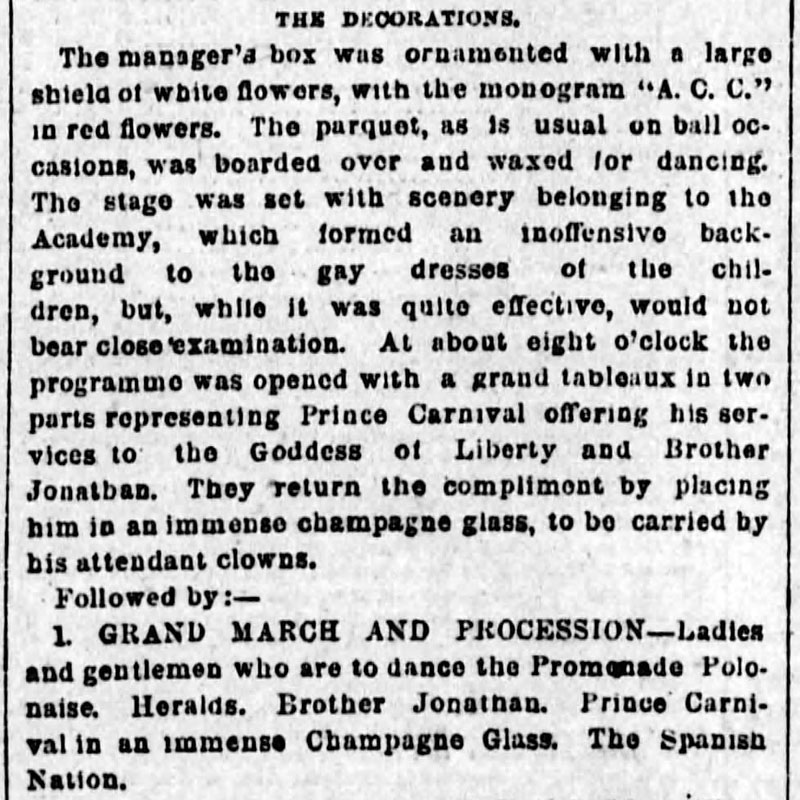
The New York Daily
Herald, February 27, 1878 (p. 10)
4) In an article titled
American Nicknames it was noted that "A native American
can not receive a higher compliment than to be styled Brother Jonathan;"
The article then explained the origin of Brother Jonathan's name.
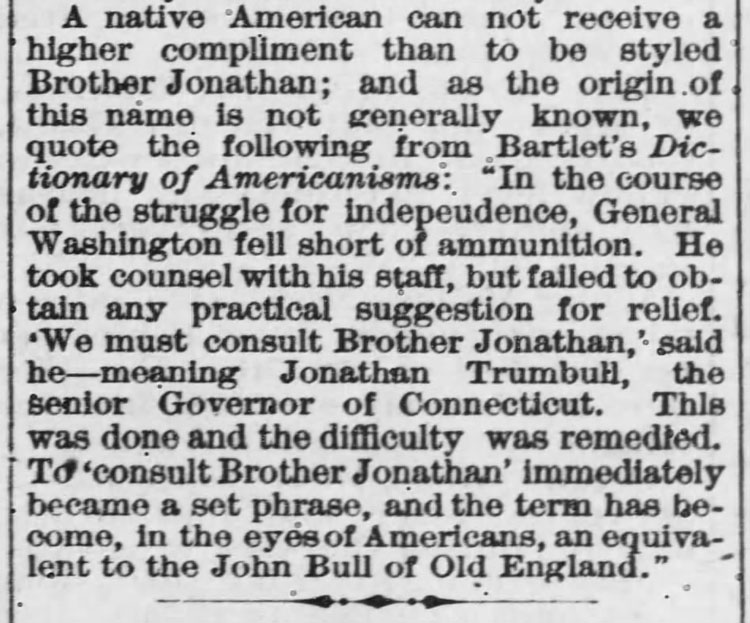
The Wynadott Herald,
September 26, 1878, p. 1 (Kansas)
5) To the European who
has studied Brother Jonathan through the medium of Sam Slick
or the broad caricatures of Yankee Hill, it is a somewhat startling
revelation that the young man who was once Brother Jonathan, but has
now become Uncle Sam...
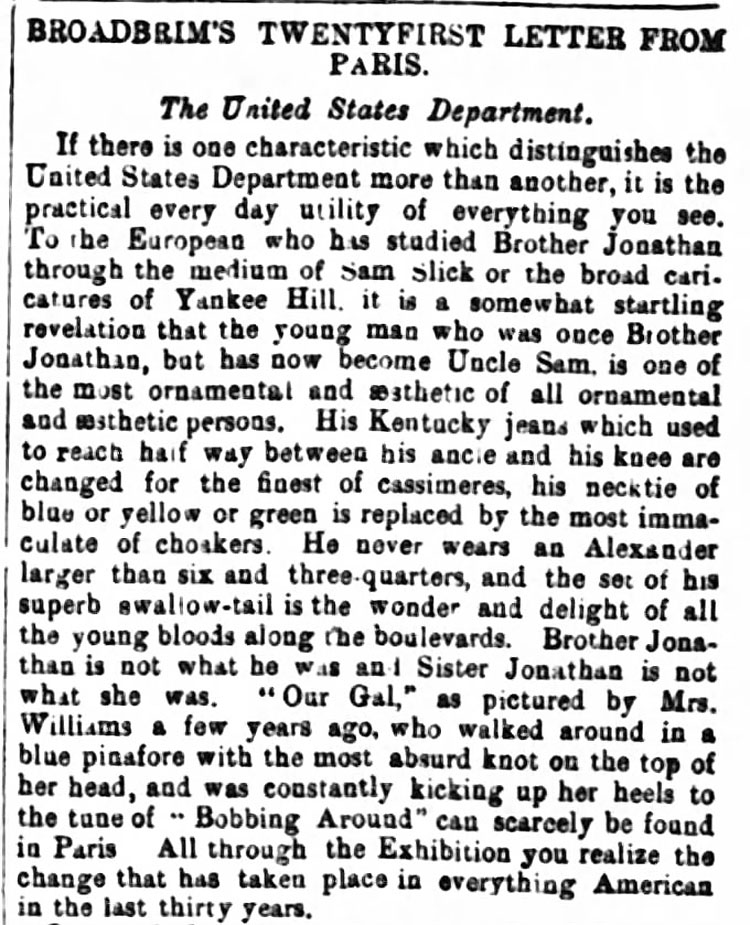
Central Somerset Gazette
(England), September 28, 1878, p. 5
6) Brother Jonathan's
abilities in international commerce are complimented - "he will
always keep his end level, in international commerce."
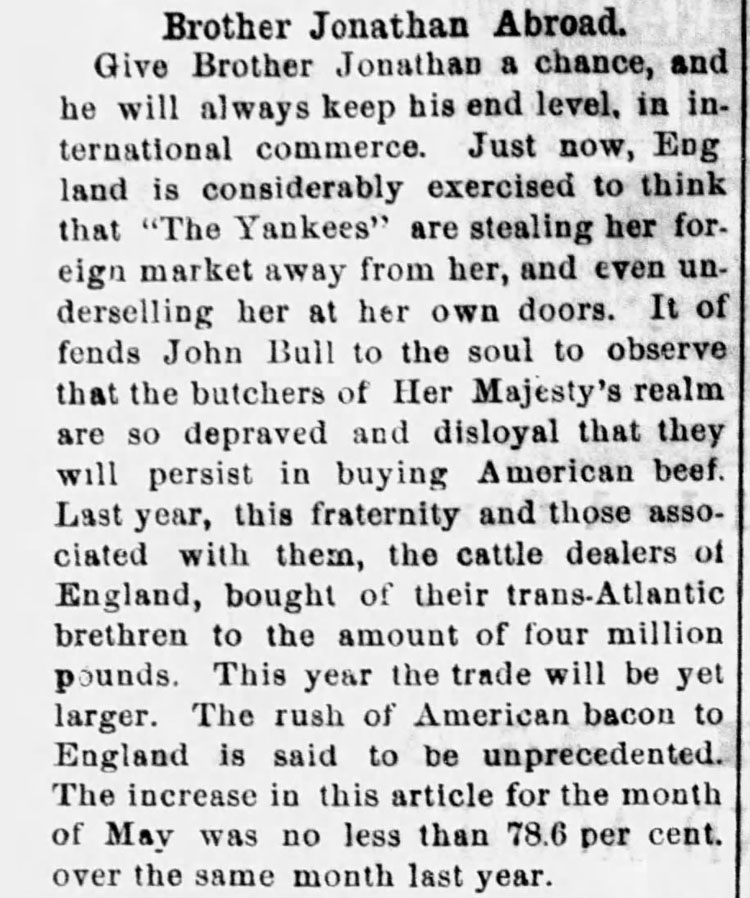
Wisconsin State Journal,
June 26, 1878, p. 1
"they always gave
Brother Jonathan credit for his smartness, his humor, and his downright
native wit....Brother Jonathan is a factor in the markets of England
in competition with John Bull himself..."
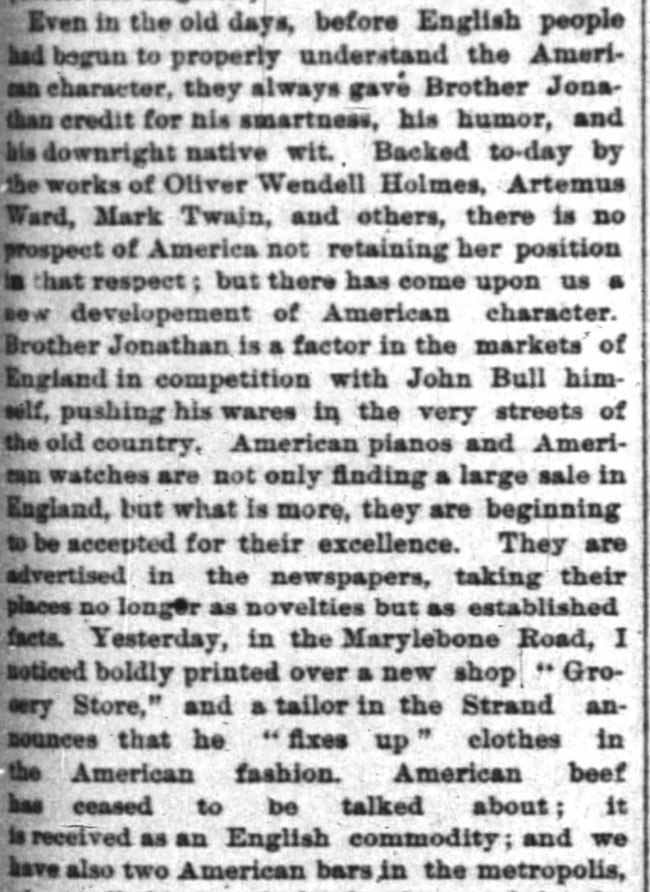
The New York Times,
October 19, 1877 p.5
1887

"The Czar Makes
a Mistake," The Manning Times, Manning, South Carolina,
January 17, 1887
1891
June 15 was established
in 1890 by the Connecticut Society of the Sons and the Connecticut
Historical Society as "Brother Jonathan's" Day.

"Brother Jonathan's"
Day, The Budget, Topeka, KS, August 15, 1891, p. 5
Postscript - Newspapers
continued to print the "Origins of Brother Jonathan"Dictionary'
articles for decades. The opening sentence might be changed to something
like "It seems strange to speak of the United States as "Brother
Jonathan," and the wonder of it is how it ever began..."
(The Daily Review, December 30, 1892) But the retelling would
then repeat the story that had been seen in thousands of newspaper
since the 1870's.
In the 1920 Birmingham
News (October 13, 1920 p. 8), and the 1910 The Messenger Press
(January 13, 1910) and the 1899 Connecticut
Western News (December
14, 1899) and countless other papers every year since 1877, essentially
the same "Origin of Brother Jonathan" that had appeared
in 1877 in the The Folsom Telegraph (December 29, 1877 p.1)
was still being published. The Bryan Times, July 3, 2010 did
a special fourth of July interview with Uncle Sam to answer questions
about himself and Brother Jonathan.
1892
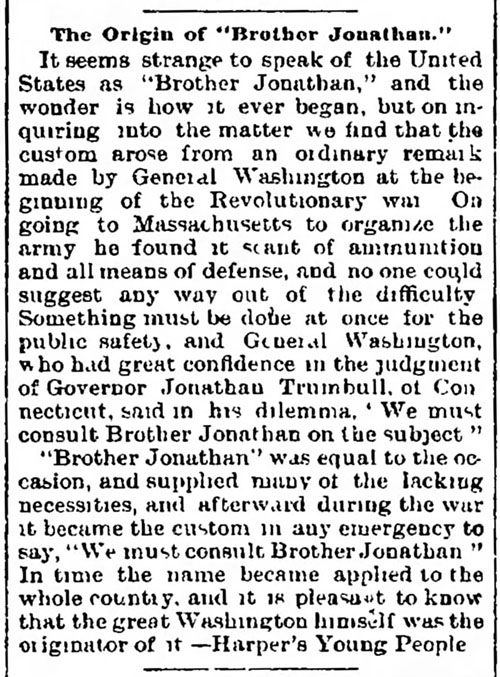
The Daily Review,
December 30, 1892 p.4 (Decatur, IL)
1895
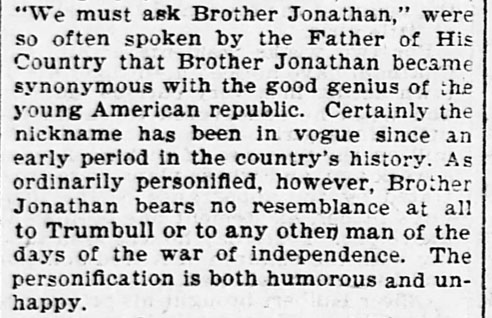
"Brother Jonathan"
- The Name Does Not Seem to be Very Popular Among Us. The
Washington Bee, August 24, 1895, p. 3 (originally from New
York Sun)
1899

Connecticut
Western News, December 14, 1899 p.3
1910

The
Messenger Press, January 13, 1910 p.7
1920

The
Birmingham News, October 13, 1920 p.8
Brother Jonathan in
Harper's Weekly Pre-1870

"SYMPATHY FOR ITALIAN
ORGAN GRINDERS," Harper's Weekly, June 1859. (wood-cut engraving
5"x7")

"THE WAR IN EUROPE,"
Harper's Weekly, June 1859. (wood-cut engraving 5"x7")
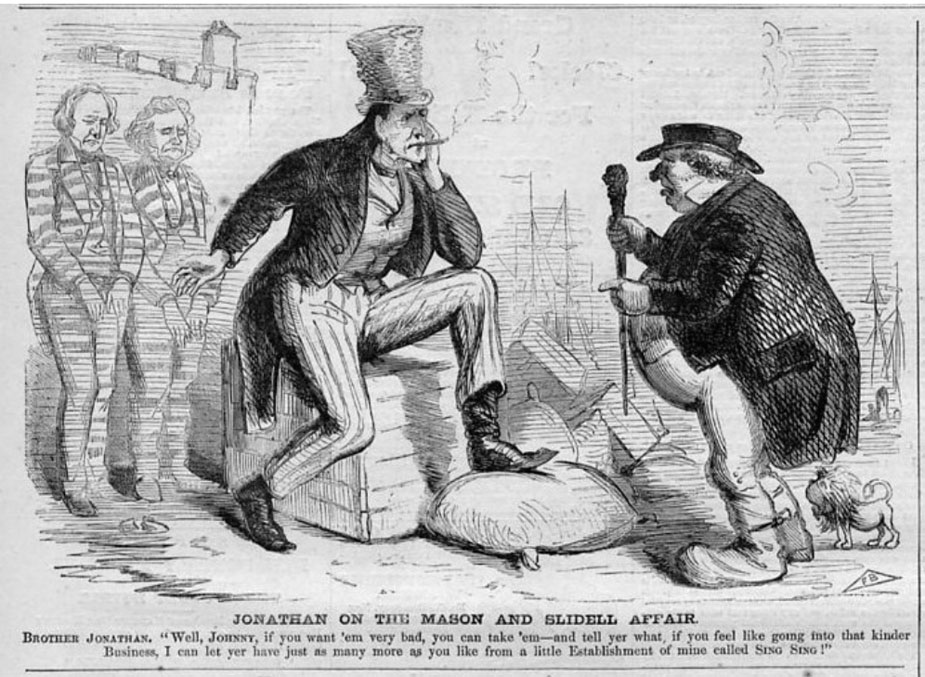
JONATHAN ON THE MASON
AND SLIDELL AFFAIR," Harper's Weekly, January 1862. (wood-cut
engraving 5"x7")

"THE ALMIGHTY DOLLAR,"
Harper's Weekly, June 1869. (wood-cut engraving 5"x7")

John Bull and Brother
Jonathan in Gilbraltor c.1900
Even though Brother Jonathan
was no longer the symbol of the United States (the role which Uncle
Sam had taken over by the 1890's) the term "Brother Jonathan"
could still appear in popular culture into the twentieth century.
After 1900 that term would still be used in relation to the British
Empire with roots going back to the addressing of an American as a
"Brother Jonathan" during America colonial times when the
British referred to the American colonists (at least the New Englander's)
as "Brother Jonathans." During the American Revolution derision
from the British surely increased when using that term of 'brother'
since those Jonathans had turned on their British Empire family
and had become their adversaries in a war of independence from King
George III and Great Britain.
In 1900, however, John
Bull and Brother Jonathan were again arm-in-arm with "Brother
Jonathan" and the United States troops.